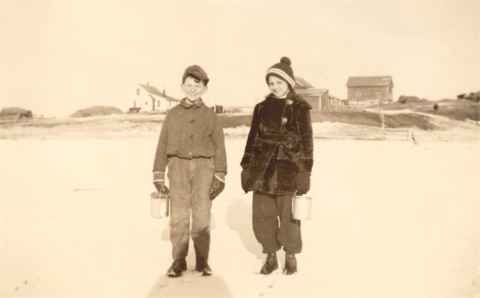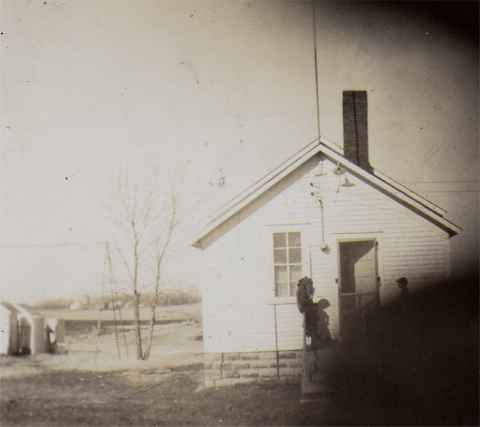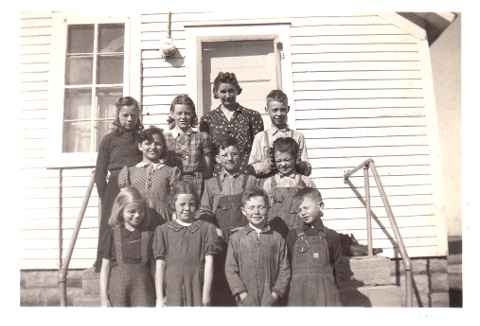When you and I were young
|
In March 1939, Michael and Myrtle Hodak and 4 kids moved to a rural abandoned farm in Kandiyohi county which had been owned by the state. We moved because a fire had destroyed the out buildings on the night of Halloween the fall before on the farm we rented near Svea. The hundred acre parcel had a slough in the northwest corner which was not taxable. Part of the fields on the south side were farmed by the adjoining neighbor. I suspect in hindsight the community was shocked to have a family move into the place which had been free for use while the state owned the land as a hunting reserve. The house had been occupied by transients or hunters who left behind enough bedbugs to paper the walls. James, the oldest was with us the first year because I have pictures of him driving the team of horses with the hayrack. Only a few memories stick in my mind. One is of warming our selves by the big Round Oak heater in the center of the living room eating our half an apple before going to bed. We listened to western music from Laredo, Texas, on the radio James built until we got a real radio to hear the news. He went to work and stayed on farms closer to Willmar. Ruth did housework and child care for close neighbors. I know she was home at night because she slept with Emil and I at least for the second winter when we slept in the room off the kitchen. Ruth took a live-in house keeping job and wasn't home much after that. Then Emil and I got our own beds. By 1940 Dad was proud of his barley crop. There was a happy atmosphere all around although the war in Europe and Roosevelt's programs were much on Dad's mind. He refused to talk, "duck soup" as he called politics, with the neighbors. When we visited we played cards instead. We visited often with Carl Beck's a few miles away so maybe they were more in agreement. We drove the 20 miles into Willmar once in a while to visit with Agnes and Casper Lobnitz. His brother, Henry, had helped Dad find the farm to buy. Mother took me and Emil up the hill to the north to visit Erickson's because we had to be friendly, because we needed drinking water. We carried our drinking water - brown with iron - from their well because we had no well. All other water was hauled Ruth, James, and Mom in 10 gallon pails from the 'lake.' The photo below was taken the following winter after the slough had frozen over allowing Emil and Naomi (me) to cut across and shorten our mile hike to and from the one room school. |

| Mother must have taken this picture. That looks like it might be her shadow falling across Emil's feet. Winter with the frozen ice simplified our walk to school. We saved a little distance (and time) by cutting across. There wasn't much snow that winter. We walked the mile to the one room school where Nora Hallberg, who had a certificate with a year of what was called "normal" school after high school to qualify her for teaching in a country school in Minnesota. Ron's sister, Arvilla, retired from teaching on her certificate in country schools when Michael and Nancy were about this age. |
| The one room had its own cast iron heater in it which the teacher had to stoke with wood supplied by the county. She had a hard job, I think, although I never thought about it at the time. The school was to include eight grades but for the next four years there were no kids in some of them. There were very few books other than textbooks, quite different from the consolidated two room school in Svea area where Ruth had graduated from the eighth grade the year before. |

| District 78 of Kandiyohi County was built on an acre of land donated by the farmer for educational purposes. The entry room on the east had the stove and wood. A closet had supplies and coats. The school room was the width of the building with four tall windows on the north and south sides. Girls and boys had separate outhouses as you can see at the far left. |

|
In 1941 four families made up the student body. After highschool, Solveig married a local farmer and moved to Stockland, California, where her inlaws sold farm machinery. I visited her in 1949. She later had two children but she was killed when riding horseback some years later. Other members of the Dalen family met with tragedy. Elvin killed his mother and a sibling. Ingolf moved away. Kathryn married a farmer and still lives on the farm southwest of the little town of Kandiyohi. I keep in touch with her and visit when I'm in Minnesota. Her twin sons ran the farm after Arnold came down with severe arthritis and diabetes. He died a few years ago. The Balkes lived on their farm towards Willmar until they were well into their 90's. I went to church several times with the Bratland's who lived just west of us. Dad shunned religion telling us about the priest in his home town who came with his hand out whenever any money came into his home. He always told me I had to make up my own mind about religion. The Sunday that a woman "found the Lord" and went convulsing and screaming in tongues toward the preacher made up my mind and led me to the straight and narrow road to skepticism. The bachelor farmer who donated the school grounds was a life saver for Emil and I during the blizzard in March of 1941. We set out for school in the morning during a light snow fall catching snowflakes with our tongues. By the time we got to school snow was really coming down and the wind got colder. We didn't know why the teacher didn't come but thought we had better walk home. The farmer came out, apparently having watched us huddle at the school, and brought us into his house. He wouldn't let us walk home. "Then take us with your sleigh," I said. No he wouldn't take his horses out in this awful weather. The temperature dropped seriously below zero in just a few hours. The snow fell as thick as fog and with the wind blowing fiercely it was impossible to see the road. We would have to stay put until the storm was over. All I remember is eating fried potatoes so he tried to take good care of us. We resigned ourselves and went to sleep in his bed. I suppose he stoked the fire against the cold. The sun shone bright the next morning and he hitched up his team and drove us home to parents who really never expected to see us alive. |
More to come